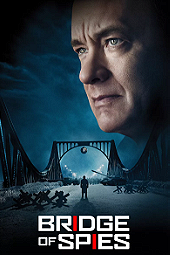Bridge of Spies is a perfectly fine movie, but that’s about all it is. It’s exactly the type of film that you’d go watch with your conservative parents who would proclaim it the best thing they saw all year, even if it was the only thing that they saw. There’s no surprises, no tension, no true moments of inspiration, just a lot of well-made craft. Spielberg has done better than this, but I suppose even a master like him can be forgiven for a middle-of-the-road jaunt every now and then, no one bats a thousand.
Bridge lays everything out in the open from the beginning, so there’s no real espionage trickery to indulge here. There’s just one decent American insurance salesman who secured a pretty nifty trade for two captured Americans, one a graduate student and the other a downed pilot, for one Russian spy. The first half of the movie is more interesting than the second, if only because Spielberg feels more engaged and alive in the first half.
This first half starts off with a wow sequence, which, by this point, Spielberg can do in his sleep. In-between his normal painterly strolls and daily routine, Rudolf Abel (Mark Rylance) gathers secret intelligence from the Russian government. His ordinariness, his ability to blend into the background or large groups of people is his best asset, and he’s slowly surrounded by forces which will imprison him. The first half of the film concerns his trial, a political showcase for American due process even for an enemy in the midst.
Never entirely subtle, Bridge of Spies’ first half presents many memorable sequences. The most obvious of which is the cut between people rising in a courtroom and students in a classroom, rising for the pledge, and watching a film about nuclear fallout and impending doomsday predictions. It’s pitch-black in its political satire, presenting the Cold War’s obsession with patriotism bordering on jingoistic beliefs. Or another in which James Donovan (Tom Hanks) rides public transport only to be subjected to judgmental and belittling glances from his fellow passengers, furious that he would dare to defend an obvious war criminal. The closed-ranks and forcibly maintaining of appearances of the 50s are reinforced in these glances, and Donovan eventually returns their glares with his own steely glances.
Once the film wraps up this trial and travels to Berlin, in the throes of splitting into East and West Berlin, that things go weird. Every time the story transfers from Donovan to an American pilot going through training, landing into enemy hands, and his eventual imprisonment and torture things go flabby. There just doesn’t appear to be much interest in telling his story from Spielberg, and it feels somehow unnecessary as so much of the film is about Donovan’s journey from normal citizen into political figure. Even Spielberg’s normally impeccable craft goes limp. A shot of our pilot in front of a green-screened background is particularly bad. And the special effects used in the scene where his plane is shot down are too glossy, shiny, and obviously fake creations. The drama in these sequences becomes undercut by the questionable film-making.
Thankfully, these sequences are limited and few, but they are generously spaced in-between the better stuff in the second half. Spielberg does better in presenting the shock and horror of the sudden rift between East/West Berlin, and it is here that the American graduate student is captured. This sequence is full of high-tension, and the kind of old-fashioned film-making that Spielberg excels at. If more of the second half had been this bravura, I would have a deeper appreciation for the film.
As it is, there’s nothing terribly wrong or memorable about Bridge of Spies. Well, Thomas Newman’s oppressive score teeters on the edge of terrible. It’s a solid piece of classical movie craft from one of our leading directors. I’m just not sure what the big takeaway was here, as so much of it feels undercooked. Hanks does solid work, but his character never really changes too much. Rylance underplays everything beautifully, playing a man who is quite aware that no matter what he does, he’s stuck in a losing position. His resigned and haunted face at the end of the film is enough to earn that Oscar nomination. Amy Ryan is stuck playing Norman Rockwell housewife, shame that such a talented actress is underutilized. Alan Alda, Jesse Plemons, and Billy Magnussen, talented actors all, are also underutilized in thinly written roles, disappearing for long chunks of the film.
Too content with coloring in the lines, Bridge of Spies is too pleased with being routine. After films like Schindler’s List, Munich, or Lincoln, I suppose I expect Spielberg’s historical dramas to explore deeper and richer themes. This takes a look at Cold War paranoia, but doesn’t say anything new or interesting. It’s a well-made film, but I can’t muster up too much enthusiasm for it.
 Login
Login